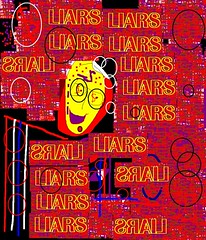 |
| Logo for Hostages TV series |
I watched the beginning of the first episode when it was broadcast last fall, and I decided then I didn't want to watch the rest. I found the premise of good guys, or at least those who claimed to be good guys, acting out plans with clearly bad consequences reprehensible, so I planned not to watch it.
But then one of the cable networks ran the first 13 episodes back-to-back in a marathon session at the beginning of the year and my sweetheart thought I might want to watch them, so he recorded them all. One day when there was nothing else on the DVR to watch, I watched the first episode all the way to the end. And still I didn't want to watch any more. I still found the plot disgusting. It wasn't just a case of the tragic hero having a flaw. It was the case of many people - I'll leave good or bad out of my description - making choices to do bad things, each for their own personal and selfish reasons. So I decided not to watch the rest.
But then Alex mentioned that his brother in England was watching the series and found several similarities with the series Homeland, another series I watched but always with a question in the back of my mind - just what message were the producers trying to convey? So I watched another episode of Hostages. And I noticed a non-plot-line similarity: both programs are based on Israeli TV series. Again, I wondered, what messages are the producers trying to convey? That government is corrupt? That politicians are corrupt? That you never really know who to trust? That the ends justify the means? That redemption can come to even those who have done terrible things? That promises only mean something until it is inconvenient to have to follow-through?
The two lines that seem to find there way into every episode are "I didn't have a choice," and "I am very sorry."
When any of the kidnapped family members declared they didn't have a choice, the kidnappers predictably responded along the lines of "you always have a choice." But then the kidnappers rely on that same line themselves when justifying their actions. "I didn't have a choice," the rogue FBI agent says to his sick wife to explain why he got involved with people in their plot to assassinate the President by kidnapping the family of the surgeon scheduled to operate on him the next day and forcing her to kill the President in order to save her own family. That's when "I am very sorry" is the predictable next line from the kidnapper. But the frequency of that utterance made the words meaningless.
The motivators for all the characters varied widely: desire to save a dying woman, money, trust, love, fear of threats to loved ones, guilt, and political differences. The alignments shifted as one motivator replaced another. Ambiguity. Ethical questions. The series had both of those in every episode.
I admit that the fact that the series is based on a series written for an Israeli audience was a major factor in my watching the series all the way to the end. I wondered if an Israeli audience is more tolerant of the ambiguity portrayed in the characters actions. On a more sinister level, I wondered if the reason was to influence the American audience to accept greater ambiguity, to accept that good people may choose to do bad things for good reasons. I can't verify either of those thoughts, of course.
I understand life cannot be divided into either black or white. There are shades of gray as well. Actions are not always good or bad on their own. Context is also important. But the notion that good people can do bad things for good reasons seems an attempt to escape the consequences or to avoid looking for another choice. When none of the choices in front of me seem good, I hope I keep looking for another one instead of settling for a poor one.
Lying seemed to come easily to the surgeon once she was sucked into the kidnappers' plans, once she concluded she didn't have any other choice. The first couple of times, I actually felt some tension as she was confronted by someone who seemed on the verge of unraveling the mystery, but she always came through with a convincing explanation. After a few episodes, there wasn't even any tension. It was clear she wouldn't get caught; she would just march forward with another lie. And as she slid down the hill of lying, she moved closer to the conviction that killing the President was the right thing to do. She convinced herself that he was a bad man, bad enough to justify killing him just because someone asked her to do so.
Life is not black and white. But we each need to be sure we don't accept that all of life is just shades of gray.
|


No comments:
Post a Comment